Millions of pieces of content are uploaded on the internet every single day. With this pool of information, finding exactly what you need is not an easy task. Thus, to make it easier, Google has an automatic sorting system designed to sort through billions of websites and content and present it to you.
Google processes billions of searches every day. It presents the most useful, and relevant content in a second. This processing, sorting, and presenting the most relevant information to your SERP is done through a Google-developed algorithm system.
In this article, we will see the Google algorithm, its updates, and how they impact your websites. Besides, we will also check how often you have to make changes to your websites to align with their algorithm updates.
What are Google’s Algorithm Updates?
Google Search Algorithm Updates are the changes made to Google’s rules and calculations. Google algorithms are the technique of collecting data from a search index and thus provide the result based on each query. These algorithms are used to determine and categorize the rankings of the web pages in SERPs.
Google is making thousands of changes yearly as compared to the early days when it only made a handful of updates to its algorithm.
The major purpose of Google Algorithm Update is the improvement of relevance and quality of search results for the users. For this, Google recommends high-quality, value-added content.
With the continuous updates of the algorithm, google tries to adapt to user behavior, the nature of users using the internet, and evolving technologies.
Some of the major changes in the Google search algorithm are as follows:
Panda (February, 2011)
- Focused on quality of content. Penalized the low-quality and duplicate content and encouraged unique and value-added content.
Penguin(2012)
- The Penguin algorithm focused on the link quality. It penalized the websites with spammy links. Its motto was to encourage the use of high-quality and relevant backlinks.
Hummingbird (2013)
- It analyzed the nature of user search intent and provided results that matched those search queries. It introduced the semantic approach and thus understood the user’s query rather than particular keywords only.
Mobile Friendly (2015)
- So, with the rise of mobile users, there was a need to have the mobile version of web pages. Thus, Google introduced the mobile-friendly algorithm, prioritizing the webpages based on their fastest loading time and user-friendliness on the mobile version.
RankBrain(2015)
- It was part of the Hummingbird algorithm. It mainly uses machine learning to understand the search queries and provide the best results.
Medic (2018)
- It focuses on the E.A.T principle. A medic algorithm was developed to enhance the user experience and thus improve the expertise and authority of search results.
Bert(2019)
- The optimized NLP technology in BERT helps improve the nature of search queries, identify entities, and interpret the text.
Core Updates
- Google releases the major updates that impact the ranking factor of websites. These updates try to improve the search experience of users.
Impact of Algorithm Updates on Website Rankings
Google’s major algorithm updates affect the website ranking. Let’s look at how these updates impact the raking factor of websites:
Ranking Changes
Google algorithms directly impact the search engine ranking of websites. For example, algorithm updates may focus on mobile-friendliness page speed or backlinks quality. Websites experience declines or improvements in SERPs based on how much they align with the updated algorithms. If they fail to meet the new updates, then there may be a decline in their rankings.
Traffic Changes
Google’s algorithm impacts the change in ranking, leading to fluctuations in website traffic. With the increase in the website’s ranking, there will be an increase in organic traffic. Thus, in order to maintain the website’s ranking, you need to keep yourself updated about the new core update of the Google algorithm.
User Experience
It is one of the key factors that determine the website’s ranking on SERPs. The major Google algorithm updates like “BERT” and “Pigeon” provide a user-friendly and seamless experience. It prioritizes the website with mobile responsiveness, the loading time of a website, and user engagement. Thus, websites that provide valuable information with a positive user experience have more chances to benefit.
On-Page Optimization
The next major area that Google’s algorithm affects is On-Page Optimization. It includes a title tag, meta tag, image optimization, header tag, and content structure. Google algorithms like Hummingbird and Panda focus on high-quality content and the audience’s experience on a website. This means the quality of website content is another factor that determines the website’s ranking.
What factors should Singaporean websites consider to align with Google’s search engine algorithm?
When targeting a website for a Singaporean audience, there are some vital things to keep in mind to make sure you’re in sync with Google’s latest changes and to boost visibility in local searches. Let’s look into some of these important factors to consider:
Content quality and relevance
Apply the “E.A.T.” principle, i.e., expertise, authoritativeness, and trustworthiness in your content. Make your content informative and engaging along with the E.A.T. principle. Google focuses on the content that satisfies the user intent. Thus, it’s important to understand what the Singaporean user is searching for and create the content accordingly.
Mobile-friendliness
With the increase in mobile users in Singapore, ensuring your website is mobile-friendly has become vital. In Google’s mobile-first indexing, your website’s mobile version is considered the primary version. Thus, try to make your website mobile-friendly as it not only offers the user experience but also aligns with the Google mobile-first indexing system.
Page load speed
With the high internet speed in Singapore, users expect fast-loading websites. Besides, google recommended having the website’s loading time under two seconds. In order to achieve this, you can optimize the images, reduce the server response time, and remove unnecessary scripts.
You can utilize PageSpeed Insights, which provides your website’s report that helps you make the required changes to optimize your page speed.
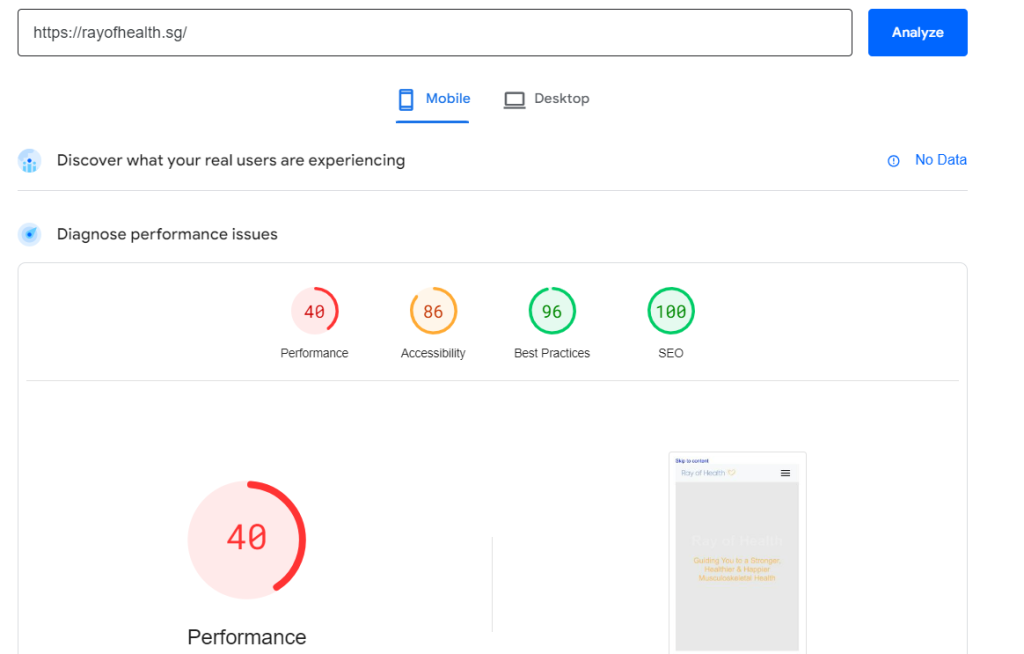
SSL Certified Website
Ensure your website is using SSL certificates. This helps to protect and rank your website. Besides, follow the web accessibility guidelines to make your site accessible to your users.
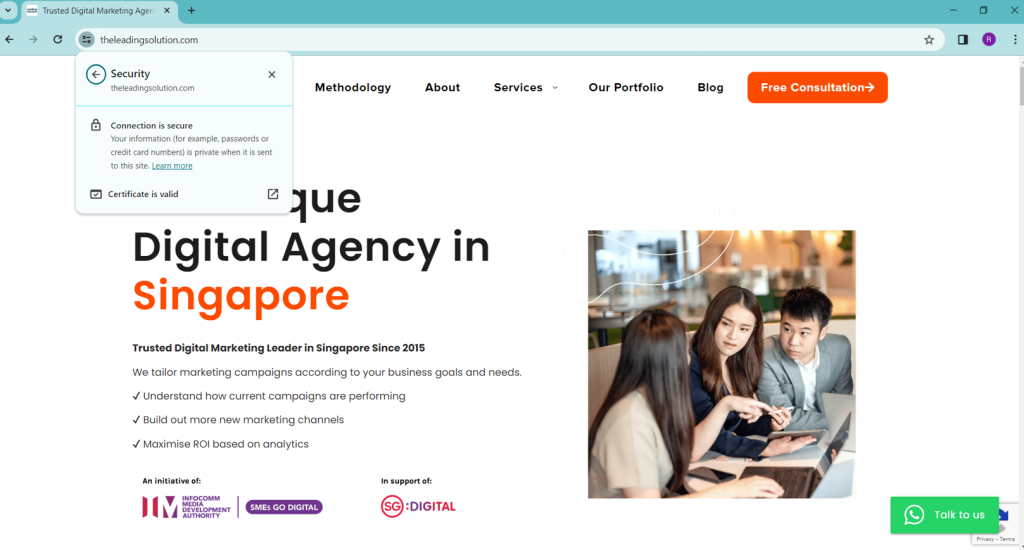
Backlink profile
Try to acquire high-quality backlinks from reputable and highly authoritative websites. This can help you to boost your domain authority and rankings.
Local SEO
For businesses targeting the Singaporean audience, local SEO is a must. This includes optimization of local keywords, having a Google My Business listing, and ensuring N.A.P. (Name, Address, Phone Number) consistency across online platforms.
Website Audit
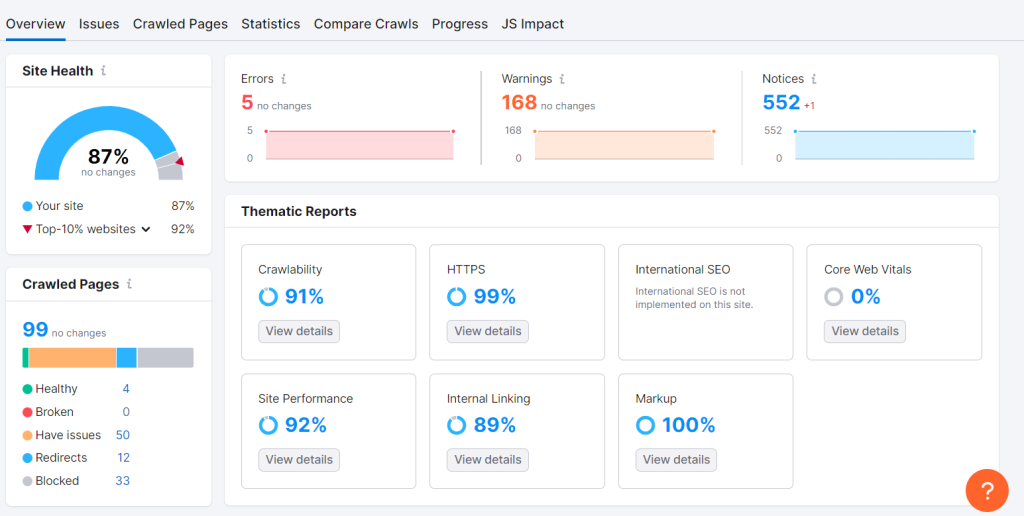
One of the most strategic ways to adapt to Google Core Algorithm Updates is to monitor website performance regularly. This includes tools like Search Console and Google Analytics. Try to track the traffic, keyword rankings, and more. Staying updated on your website’s performance allows you to rapidly spot any changes produced by an algorithm change and alter your SEO approach accordingly.
Strategies to Adapt to Algorithm Updates
Google algorithm is classified into two types:
Core Updates
The core of the major types of change in Google’s algorithm impacts a significant part of search queries.
Minor Updates
The small changes to the algorithm that affect a certain percentage of search queries are minor updates. They have very little impact on the website, and some of these can be neglected, too.
Google updates its algorithm to align with user behavior and adapt to the latest technologies. Some of the google’s latest algorithm are as follows:
Local SEO Changes
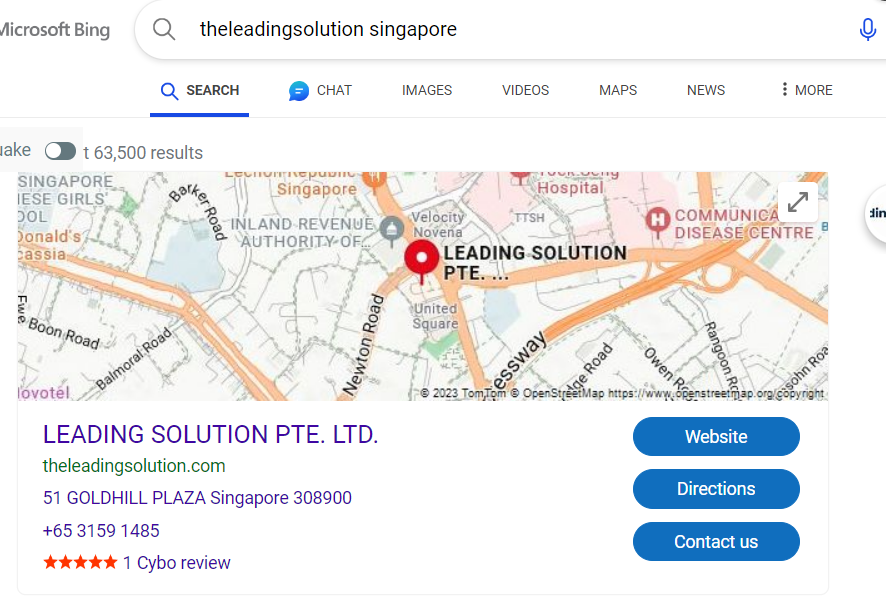
Google’s local ranking algorithm indicates the shift in how the local business will be ranked in SERPs. “According to Google, – Google Business Profile is turning off, and the users who visit your website will be redirected to your new Business Profile from March 2024 to June 10, 2024.”
What to do: Google Business website manager should try to check their online visibility and ensure their presence is smooth before March 2024.
If you find it hard to make your digital presence online, then check out The Leading Soultion, which has the expertise and team to help your website shine in digital presence.
Structured Content and Meta Descriptions
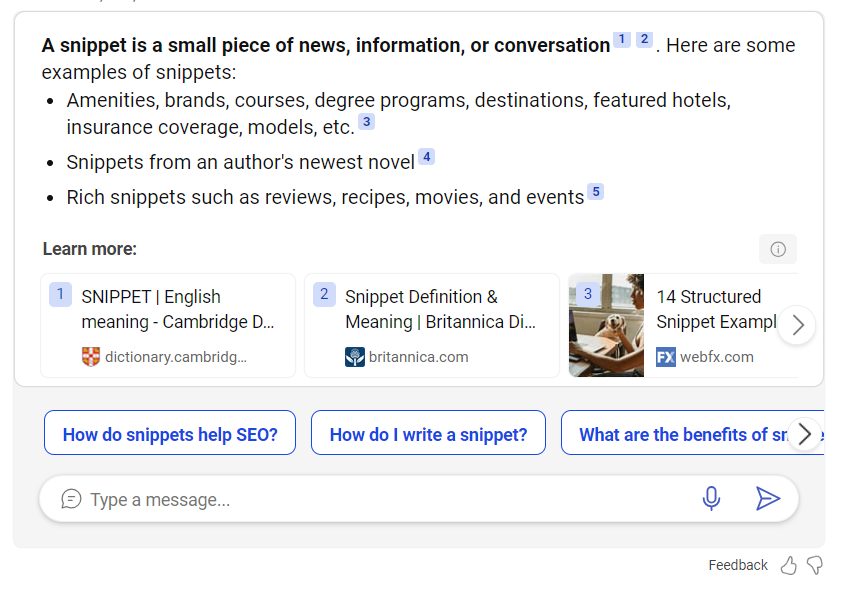
Google suggests, “content on the page is important rather than meta description and structured data for snippets.” This prioritizes creating engaging webpage content.
What to do: Try to provide the user with engaging and relevant content to display for your snippet.
Technical Adjustments
Removing the Google Crawl Rate Limiter and addressing the WordPress A.M.P. plugin vulnerability are some technical adjustments that impact the SEO strategies and site management.
What to do: Google announced, “Webmasters without Crawl Rate Limited should not be afraid; google no longer uses it.”
Similarly, updating your website version to 2.5.1 is recommended for the XSS vulnerability.
Case studies of Singaporean websites affected by algorithm updates
SAAS Company
One of the SAAS companies of Singapore faced the challenge due to the August 2023 Google search engine algorithm updates. The algorithm change drastically dropped the website traffic. Thus, to tackle the algorithm update, some strategies were adopted.
In SAAS company, most of the leads come from content marketing. Thus, the strategy was adopted for content marketing based on the change in the Google updates algorithm. The strategy which was implemented in SAAS company was as follows:
- Content Audit
- Analysis of user behavior for a better understanding of search indent.
- Conduct Keyword research and high-quality content
- Implement the internal linking strategy
- Ensure the content follows E.A.T. principle
- Meta Tags Optimization for better click rates
After the implementation of these strategies, it achieves the result as follows:
- It shows a 129% increase in impression
- 400% clicks, which shows a higher percent engagement and interest ratio
- Significant growth in search volume keyword rankings
Conclusion
Google’s algorithm updates are the major aspect of the search engine. It is designed to improve search results user experience, quality, and relevance.
If you notice a sudden drop in traffic on your website, it might be due to updates to Google’s algorithm. Thus, always use tools like Google Analytics and Search Console to monitor your site’s performance after major updates.
If you are searching for any trustworthy, reliable, and expert SEO agency in Singapore that will keep you on track with recent Google algorithm updates, then The Leading Solution is here to help you. Visit our website today and get a free consultation on our SEO services. Also, check the SEO package and get the free quote today.
F.A.Q.s
Why is it important to keep track of Google Algorithm Updates?
Keeping track of the Google ALGORITHM is essential for SEO, digital marketing, and content creation. These updates are critical in determining a website’s online visibility and ranking. When Google updates its algorithm, it directly impacts the search results of a website. Thus, to keep your website on search pages and make a strong digital presence, always try to produce high-quality and user-friendly content no matter how the algorithm changes.
What steps should I take to adapt my website to the new Google algorithm?
Adapting your website to new and changing Google algorithms involves a strategic approach. Some of the steps include:
- Stay informed and regularly check for Google announcements and webmaster guidelines for algorithm updates on SEO.
- Always track and monitor your performance metrics.
- Performed a website audit to identify any possible website issues, such as broken links, high-load web pages, etc.
- Optimize your web pages for voice search queries to align with the search trends.
If you carry out these important steps, you can adapt your website to a new Google algorithm. This will help you gain online visibility for your website in Google searches.
How often does Google update its algorithm?
Google updates its search algorithm frequency with many minor changes almost daily. Some of the major significant updates happen several times a year. The frequency of updates can change, and all the Google SEO algorithm updates are not publicly announced by Google. Meanwhile, the major algorithm updates, also known as “Core Update,” are announced by search engines.
It is estimated that Google updated its algorithm around 500-600 times yearly.
How do I prepare for Google Algorithm Updates?
Always research and get up-to-date information on Google’s latest updates. Besides, follow the below points to prepare for an algorithm update
- Research the latest updates
- Make a gradual change to your content strategy
- Stick with the guidelines of Google
- Check for the patterns
- Consult the SEO experts
When was the last Google algorithm update?
The most recent core update of Google Algorithm took place in November 2023. Besides, google also updates specific parts of its algorithm like local searches, product reviews, and spam detections. The very recent update was made in November 2023, a review update. Furthermore, Google also makes small, unannounced updates frequently.
Why does Google make updates?
Google uses the automatic technique to rank the search results. It aims to improve its techniques and systems to provide better results satisfying the user. Thus, it keeps updating its system to understand the user and their behavior better.
What do I need to do if there are new Google updates?
If your content is helpful, unique, and people-first content as recommended by Google, then there is nothing to worry about the SEO Google algorithm updates. Google will reward such content and help rank better despite any updates.
However, if you notice any major website traffic changes, check the latest Google algorithm updates guidance on the Google Status Dashboard. Ensure that there are any major changes or improvements needed.



